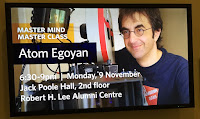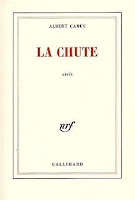Most unfortunately, I could not attend the annual Quinn
Memorial lecture at UBC this year! The main reason was problems with scheduling
as I would have had to cancel my classes in
addition to finding a suitable substitute and all this would have been even
more work than simply going to work. My apologies for that and hopefully I can
re-arrange my commitments so that I can attend, ruminate and blog about this
wonderful event come next year.
In lieu of this, I had the opportunity to attend another UBC
event, the Master Class with renowned Canadian film director Atom Egoyan. When
I first received the email of the upcoming talk, I did not hesitate and bought
a ticket immediately. I marked the day on our kitchen calendar many days in
advance. I could not believe that I would not only be in the same room with
this esteemed director but also perhaps be given the chance to ask a question,
shake his hand and get a selfie and / or an autograph. The latter I realize is
more or less passé these days, a circumstantial relic of the non-technological
past.
As it turned out, I arrived early that evening. This allowed
me to get a rather good seat; yet to my slight dismay, the first and half of
the second row were already reserved. As this was a special opportunity for
film grad students to see and meet the iconic Canadian film-maker, they were
immediately and conveniently assigned the best seats of the house, so-to-speak.
Notwithstanding, my seat was not too bad as the (hastily taken) photo above can
demonstrate for our intents and purposes here.
The evening began with a couple of (redundant?) speeches and
a showcase of the centennial celebration of UBC with a brief video of some
sorts. My focus throughout was on the man sitting in front of me who was close
enough to be poked. Yes, this actually crossed my mind! I considered it
something one could cross off one’s eternal bucket list, namely to poke a
Canadian legend. Believe me, at one point I did lean forward with my hand still
idly lying beside me.
What would be the worst that could happen to me? I would
sincerely apologize to him and explain the reason for my poke. Depending on his
level of humility and sense of humor, he might even smile or perhaps use it as
an anecdote at another of his upcoming talks. I would be indelibly entwined in
his memory as the man who poked him at UBC.
Now why would I go to such length and effort of poking Atom
Egoyan? Let me tell you that he is among my Top 40 directors of all time. It may
not sound like much, but you should see the list of these world-renowned
directors. Exotica (1994) was my
introduction to his oeuvre and what an introduction it was indeed! That movie
blew me away and I would say it is tied with Arcand’s Jesus of Montréal (1989) for best Canadian movie I have ever seen!
Furthermore, I quite enjoyed his Adjuster (1991), a film that was decidedly different from other
types of films I had seen. Felicia’s
Journey (1999) impressed me as well but not so much due to its erratic and
rushed ending (that is, if memory serves me right) and his most celebrated film
to date The Sweet Hereafter (1997) failed
to impress me much. Ever since then, for one reason or another, his more recent
movies fell under the radar; in addition, I had read movie critics feeling let down
by this undoubtedly talented director. Yet my most recent film of his was Remember (2015) with Christopher
Plummer, a film that was expertly made but proved to be problematic on
different levels. One day I shall put my thoughts on it in writing in the form
of a movie review.
Yet back to the evening and sorry for the diversion. To make
a long story short, I did not poke. He was then (finally!) invited to the
podium and delivered his speech. It started off on a notably false note for me.
He alluded to the sexual allegations that are haunting Hollywood these days and
that he felt disgusted about it. Of course, I completely agreed with him but
unfortunately, there seemed to be no connection or relation with his actual
talk, which focused on his upbringing and his experiences of film-making. I
felt that he used current events as a hook but one that did not lead anywhere
but was used merely to make himself look and appear good. In other words, a
type of Ego trip (coincidentally the first three letters of his chosen last
name).
Yet over the course of his talk, he did win me over with
some of his personal anecdotes as well as observations on the task of
film-making, some of which I will aboard here. First off, he talked about his
upbringing in Victoria as a very young Egyptian-born Armenian who spoke not a
word of English. That resonated with me because I had gone through similar
experiences where I was thrown into a country and culture without having any target
language skills to get by with.
In his case, he had at least some, if merely feeble and
symbolic support from his father. It was he who told the kindergarten teacher that
should his son utter a particular phrase in their language, it meant he was
hungry; any other phrase simply meant he needed to go to the washroom. Yet when
young Atom verbalised his need to go to the washroom, he was given a sandwich
instead. This not only confused the young boy but made him aware and averted
him of the delicacy and fragility of communication.
We may think we have the means to communicate but that may
not be the case. Misunderstandings abound or lurk around the corner. This would
happen too when he would talk about his ideas for films or literary adaptations.
At times people would say they understand, but he knew that they did not. At
other times, writers would disagree with him until they saw the finished
product, as was the case with both Felicia’s
Journey and The Sweet Hereafter.
To his credit, it must be very difficult to give someone a clear picture of the
contents of one’s mind, so, more often than not, he would let the images speak
for themselves once the film was made.
Egoyan explained that his reason for adapting other people’s
materials was because he himself did not have access to those worlds and
experiences. Then we would take their materials and adapt them in his idiosyncratic
ways, which might or might not resonate with the original author. Film
adaptations of literary works are a tricky subject and it is about both
preserving the essence of the original work but also adding one’s unique and
visual touch to the content.
Either way, what this showed me was that film-making was a
lonely process. Writing certainly is as writers spend most of their time alone
producing sentences that are stitched together carefully and then finally
presented as a fixed piece of work. In film, it seems that although you are
constantly surrounded by people as there are many others involved in the film-making
process, in the end, it is an equally lonely endeavor. Although he works
closely with actors, some of them prefer not to talk much, as was the case with
Kevin Bacon, according to the director. All and all, the only one who knows
where all of this is going and how it will all look once put together will only
be in the mind’s eye of the director. Yet once all the elements combine and
come together, the finished product can then be shared with others.
One of the things that strikes me about films as well is the
use of music and I was glad but not particularly surprised that Egoyan himself
relished that process. It is often the final but oh so important touch to the
film. It is the carefully selected bits of soundtrack that give the film its
necessary depth and often identity. That is an important part of film-making;
the other would be to imbue your characters with empathy. That way stories can
resonate with us and even so-called “cold” film-makers like Michael Haneke show
empathy even for dubious or downright despicable characters.
The evening ended with a Q & A session. My question
would have been about his relationship with technology. Although technology
represents an important part of his films, it is also portrayed as an
alienating effect. I wanted to know how he felt about this himself. He alluded
to some of it as he told us, with some visible regret, that the old and
intimate experience of sitting in a dark room with strangers and seeing the
actions projected on a screen was slowly dying out. Instead, we stream movies.
That has led to an explosion of content and although it is often of very good
quality, it is too much to consume for any single individual.
I decided to postpone my question for a little later in
person. We had been given a ticket that would be converted to a drink of our
choice, for me it was an unexpected but very welcome glass of red wine. At the
reception, I literally hung around in the vicinity of Atom Egoyan who was
approached by many attendees with numerous questions and comments.
I stood there patiently, waiting for him to notice me. But
unfortunately, people would butt in or slightly shove me to the side. But no
matter, I had the iron resolve to abide my time. I was going to ask him my
particular question about technology and end it on an ironic note with a selfie
of the two of us. There! Finally, he took note of me and raised his eyebrows
and walked half a step in my direction before he was pulled over to the side by
one of the organizers. There was thereafter another photo-op with certain people
after which I was immediately forgotten again.
After some more futile waiting, I decided to leave the
scene. I had seen and heard enough so that I could sit down and type away for a
blog post. It was not overall as personally satisfying as I would have liked but
then again it also reminded me that in the end, even film-makers, who are the
equivalent of celebrities for me, are human after all.
Although I appreciated Egoyan’s sense of humor and his
(apparent) modesty, in the end I realized hat even great filmmakers are human. As
is the case with any artist or celebrity, we impose upon them qualities they
may or may not have, and whether we realize this or not, we put them on
pedestals. I was glad to have seen and met this great director, but at the same
time it slightly chipped away some of my adoration I had for him. After all,
even the great turn out to be made of flesh and blood and not that different
from the rest of us and in the end, we end up feeling slightly conned and
deceived.




